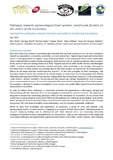| dc.contributor.author | Wach, Elise | |
| dc.contributor.author | Ripoll, Santiago | |
| dc.contributor.author | Taylor, Rachael | |
| dc.contributor.author | Wane, Seydou | |
| dc.contributor.author | Ndiaye, Tabara | |
| dc.contributor.author | Vásquez Zeledón, Jorge Irán | |
| dc.contributor.author | Ferguson, Clare | |
| dc.contributor.author | Ousseynou Ly, Mamadou | |
| dc.contributor.author | Drame, Mamadou | |
| dc.contributor.author | Sanchez Gutierrez, Julio Hector | |
| dc.contributor.author | Smaje, Chris | |
| dc.date.accessioned | 2017-11-24T13:38:39Z | |
| dc.date.available | 2017-11-24T13:38:39Z | |
| dc.date.issued | 2017-04 | |
| dc.identifier.citation | Wach, E. et.al (2017), Pathways towards Agroecological Food Systems: Small-scale Farmers at the Centre of the Transitions. Project Paper, Unpublished | en |
| dc.identifier.uri | https://opendocs.ids.ac.uk/opendocs/handle/20.500.12413/13373 | |
| dc.description | Now more than ever, evidence overwhelmingly concludes that our food systems are not currently working to nourish our populations, ecosystems, economies, or social connection | en |
| dc.description.abstract | Now more than ever, evidence overwhelmingly concludes that our food systems are not currently working to nourish our populations, ecosystems, economies, or social connections. Agroecological approaches have been shown as having potential to address many of these problems in the mainstream food system, particularly when combined with concepts of food sovereignty, which localise control, and place producers and consumers at the centre of decision-making (Pretty et al 2006, Chappell and LaValle 2009, Sevilla Guzman and Woodgate 2003). However, knowing the principles and the end goals, while invaluable, is not enough. We need to transition from the food systems we currently have to the food systems we envision for future generations. Where do we begin and who should lead that process? In line with principles of food sovereignty, that transition needs to be led and owned not by outside experts or researchers but by the people most directly affected by and typically excluded from decision making within the current food system (i.e. small- and medium -scale farmers, workers involved in harvesting and food processing, cottage manufacturers and consumers across socioeconomic classes). It must also respond to the current level of globalisation of our food systems. For example, a decision to localise consumption in one country can greatly affect export-focused producers and economies in another. | en |
| dc.language.iso | en | en |
| dc.rights.uri | http://www.ids.ac.uk/files/dmfile/IDSOpenDocsStandardTermsOfUse.pdf | en |
| dc.subject | Agriculture | en |
| dc.subject | Livelihoods | en |
| dc.subject | Nutrition | en |
| dc.title | Pathways towards Agroecological Food Systems: Small-scale Farmers at the Centre of the Transitions | en |
| dc.title.alternative | Learning from Participatory Research and Action Approaches to Transforming Food Systems | en |
| dc.type | Article | en |
| dc.rights.holder | Authors | en |
| dc.identifier.team | Business, Markets and the State | en |
| rioxxterms.funder | Default funder | en |
| rioxxterms.identifier.project | agroecology | en |
| rioxxterms.version | NA | en |
| rioxxterms.funder.project | 86624613-7bf7-4117-9d5e-f2175d036cd1 | en |

